To Fight Peritoneal Mesothelioma
At 75, Salvatore Pisciotta sits perfectly erect, with a dancer's awareness of his own body. He is poised and at ease at the same time, and very still. His dress is cosmopolitan. He is lean; he appears much younger than his stated age. The muscles of his neck -- two long, thick cables -- hold his head slightly forward, and his gaze steady and penetrating, almost disturbingly so. His dark eyes are focused far-off and keep flashing like a lighthouse beacon as he speaks in a raspy voice, unmistakably from Bayonne, New Jersey, and begins to tell his story.
"I am the son of Sicilian immigrants. I left home on a Merchant Marine ship, the Boonesborough, bound for Shanghai and the Arabian Peninsula. I have been all over the world . . . ".
His inner life is as fantastic as his travels; the two are intertwined. Sal's reading literally transports him -- he is Henry David Thoreau's idyllic "expert in home cosmography." When he was much younger, he had read Jack London's "The Call of the Wild", and a vast, harsh place of opportunity for his will opened. After serving his country with honor in the Navy and then in the Army Air Force, Sal arrived in the Alaska Territory in 1951, looking for work as a pilot. He soon found work as an insulator with the Heat and Frost Asbestos Workers Union in Anchorage.
The money was good, but the work was hard, and dirty. Over the next 27 years, Sal was exposed to tons of poisonous asbestos dust, both from his own work and the work of other trades, on massive industrial and commercial projects, not only in Alaska, but also in New York City, New Jersey, Washington, Oregon, and California.
Sal would quote poetry to burly pipefitters and argue philosophy with masons while his arms were covered to the elbows in "mud", the insulating cement of his trade. Still a voracious reader, he knows and loves the works of such authors as Feodor Dostoyevsky, Jerzy Kosinski, Mark Twain, Dante Alighieri, and Edward Gibbon.
Sal tells me that since his diagnosis, he has experienced time as a torture and yet keenly appreciated the world's beauty, like the condemned Raskolnikov from Dostoyevsky's "Crime and Punishment", pierced by the sounds of loons crying. We start talking about Dostoyevky. I tell him my favorite is "The Idiot." Sal becomes more animated, flashes a smile, and suddenly begins a comparison of the title character of "The Idiot" with Kosinski's Chauncey Gardener from "Being There." Sal is amazed that with so many unanswered questions, so many places to visit -- in the world as well as in the mind -- that there are folks who live their lives in quiet desperation.
Salvatore Pisciotta demonstrates that a degree is not necessary for perception, or learning. One must simply be awake -- open to new connections, new realities, new sounds, new words. He reads Italian newspapers daily to hold on to the language he heard his parents speak at home.
He started his family late in life. He was 40 years old when he married, and by the age of 45, he had three children, a boy and two beautiful girls. After the birth of his third child, he decided then and there to do everything he could to live as long and as well as he could, so he could fully share in the lives of his children, and his grandchildren-to-be.
He quit smoking cigarettes. He became a vegetarian. Two years later, he started his own insulation company. He was in control. The marriage did not last, but he enjoyed a deep relationship with his children. Sal saw to it that they went to the best schools. His eyes moisten and shine as he remembers his daughter Tristan holding the stage as Helen Keller in "The Monday After the Miracle". He clinches his right fist, puts it over his heart, and says, "Up there, she was that girl. I felt it." His youngest daughter, Michelle, studies voice, namely, operatic soprano.
The grandchildren came, and he enjoyed them. He kept in excellent physical condition. As recently as two months ago, he worked out daily in "jazzercise" and cardio kick-boxing classes. He and his son Len, a teacher, were planning an ice skating trip to Sweden for February, 2001. He was still taking
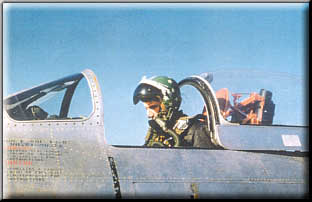
Then suddenly, two months ago, Sal noticed blood in his urine. He consulted with Dr. Tom Lue, a San Francisco urologist. Among other diagnostic tests, Dr. Lue employed CT scans, which revealed the presence of fluid in the abdomen. Dr. Lue asked Sal if he had ever been exposed to asbestos. A paracentesis was performed at the Mount Zion Medical Center of the University of California at San Francisco (UCSF). Cytological testing upon the fluid removed from the abdomen revealed the presence of abnormal mesothelial cells.
Sal's primary physician, Dr. William Schraeder, referred him to Dr. David Jablons of UCSF. Dr. Jablons wanted further CT scans of the abdomen and chest before proceeding further. Sal was then referred to Dr. Richard Hiler for laparoscopy with tissue biopsy. Dr. Hiler performed this procedure on Tuesday, August 15 at California Pacific Hospital in San Francisco. Two days later, that hospital's pathology laboratory reported its diagnosis of malignant mesothelioma of the peritoneum.
Mesothelioma. The word horrified Sal. He had heard of this cancer. It had taken old friends, coworkers. But he had done everything he could have to keep his body healthy. He could not believe this was happening. Dr. Hiler (whose own father, a shipyard worker in the Bay Area, fell to the cursed mesothelioma a few years ago) was talking to him, telling him that the cancer was very aggressive, very deadly, and that there was not much that could be done, and Sal was hearing the words like they were far-off.
It was a nightmare, unreal. Others began to act differently. Sal recalls that the next time he saw Dr. Schraeder, "He looked at me like I was a dead man."
Sal searched the Internet for answers. Within two weeks, his testimony under oath against dozens of former asbestos manufacturers and suppliers had been videotaped. Hours after concluding his testimony, he boarded a "red eye" for New York City, to meet with oncologist Dr. Robert Taub of Columbia University, one of the foremost experts in the world in the treatment of peritoneal mesothelioma, and a member of the Science Advisory Board of the Mesothelioma Applied Research Foundation (MARF). The day after meeting with Dr. Taub, Sal met with Dr. John Chabot, the thoracic surgeon with whom Dr. Taub works.
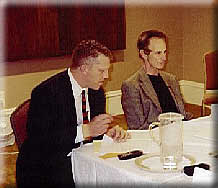
The plan, as Dr. Taub and Dr. Chabot explained, is to open the abdominal cavity and shave the tumor to no less than one centimeter. Chemotherapy would be administered intraoperatively. The surgery could be scheduled twelve days hence, but Sal would have to decide immediately.
Sal did not hesitate. "With this cancer, you must attack. You must go after it with everything. This is my nature." Confident that he had met with the best in the country, Sal scheduled the surgery, then returned home to San Francisco.
Sal is not passively awaiting the surgery. He continues to consult with the best and the brightest, including Dr. Brian Loggie. No longer physically able to kick-box or jazzercise, he has taken up yoga, which has helped keep the fear at bay, helped maintain his preternatural calm. Salvatore Pisciotta is digging deep, entering uncharted territory, with eyes wide open.
"Before this, I knew I was going to live to be 100. I have a sister in her nineties. A couple of years ago, she got hit by a car. She hit the ground and rolled, like she had seen on t.v., and walked away unharmed! Now . . . I just want to live until they find a cure. And I believe I will."
We believe too, Sal. We will keep you posted on the progress on Sal's incredibly journey.
* * * Posted below is more on Salvatore Pisciotta, from one of his daughters:
My name is Michelle Pisciotta-Masteller and Sal is my father. I wanted to send you a message, reflecting my own feelings about his illness and how it has affected myself and my family.
Anyone who know my father knows what an incredible human being he is. Even at 75, I consider him to be one of the strongest, healthiest, youthful, passionate people I know. He has been a vegetarian for decades, he is an avid kickboxer, Karate student, Jazzercise enthusiast-believe me, no one has ever been close, when taking a guess at his age! I have always respectedhow he lives his life and though I have taken my own father for granted at times (I think we all do), we have only grown closer over the years and Ihave only grown more proud to call him my father-and my 2 boy's 'Grandpa'.
Throughout my life, every time I have found myself in a compromising situation, I have always been able to call my father and know he would do anything to help. He has always encouraged me to pursue my talents, live healthy, and be the best I can be. Even though there were times I wasn't fulfilling all of these expectations, my father was always there to give me a hug, tell me I'm beautiful and how proud he was of me-always my biggest fan, as he still is today.
As a Grandpa, my father has been there-to play, to babysit, to hug...you name it. One of the biggest shocks to my system lately is the possibility of him not 'being there' to see my 2 sons grow up. This is an extreme shock because I always assumed that he, out of all of the other people in our lives, would be one person who I just knew would be around. Collin and Antonio (my children), are very close to their Grandpa and as their other grandfather barely knows them-my father has been the one 'constant' to fill that role. He is so patient with them-he wrestles and tumbles like a kid himself-and though it's hard for my ego to admit it, he has offered some positive parenting advice over the years that has been helpful (well, some of it!).
We were recently at a wedding in Southern California together. My husband, kids, and my father were all staying at a hotel and as we were all falling asleep, my father mentioned that he may have to postpone the recent work he had just picked up back East. I asked him why and he said he didn't know just yet, but would discuss it with me at a later date. The moment turned surreal as I heard myself ask, "What's the matter Papa-Are you sick?". I have never really had a reason to ask my father this question before and as I heard my words and then a silence, I knew the answer was not going to be, 'No-I'm fine...". My father was choked up at that point of the conversation, trying to give me the most positive response he could. He said he had been at the doctor for something minor and well, they found something. As we all laid there in the dark, I began to pellet my father with questions-I wanted to know that the doctors had it all under control and this was something that they could simply 'Zap'-take care of. No matter how hard I tried, though-He just never gave me that reassuring response I needed. A few days later, he was in the hospital, having biopsies taken. I nervously called him daily, waiting for that 'I'm Okay'-but when he finally told me, 'It's Cancer...Well, that's the way it goes", I finally could relate to all of those stories I have heard, when someone you love is faced with such a fight. I tried to keep my composure, but could not hold back from crying-I told my father that he has always been there for me and I will be there for him-I told him I was not ready to lose him. He cried and could not speak for several moments. In all of my 31 years, I have never before heard my father cry. I have never before heard true fear in his voice.
Well, my family and I will be moving back to California in a couple of weeks, to be near my father. Even if he doesn't require any help (as he has never required any help), I will be there. He has loved my sister, brother and I all of our lives-he has done everything for us. Even when our parents divorced (when I was 5), he financially supported us, as well as our mother, until we were grown. We always had a beautiful home, the best schools-more than we needed. He supported our mother because, as he always said, "She is the mother of my 3 children.". I could never understand families with fathers who refused to pay child support. We are very lucky to have this man as our father.
Well, I know this is a jumble of run-on sentences, but this is what spilled out when I decided to send you this message. As I have done some reading about asbestos exposure and how there has been knowledge for 70 years about the serious health effects, but no warnings were ever given to workers, I have developed anger. What's so frustrating is that there is nothing I can do with this anger, as the damage is done-in the form of horrible Cancer in my father-a man who you would expect to live well into his 100's. It just seems so senseless to me. Still, I pray every day.
Kind Regards,
Michelle Masteller
*** POSTED SEPTEMBER 20, 2000 ***
An Update on Sal's Condition
Photographs taken on February 15, 2001, while being treated in New York City.
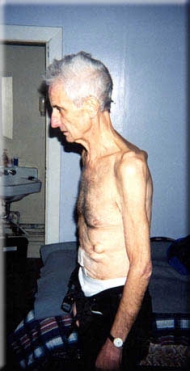
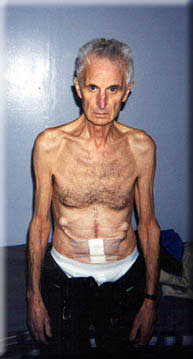
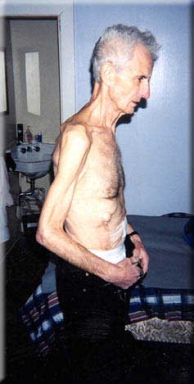
Mr. Sal Pisciotta passed away on June 5, 2001


